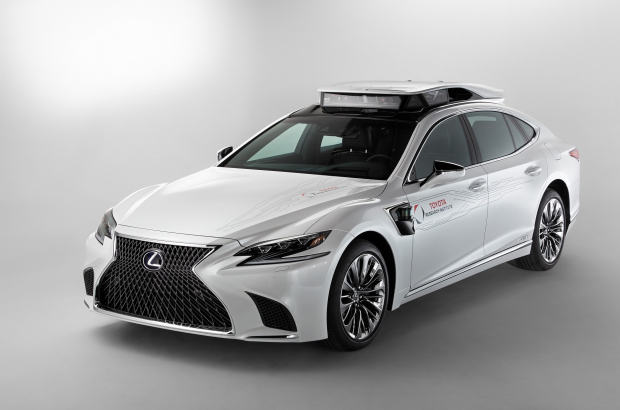- Daily & Weekly newsletters
- Buy & download The Bulletin
- Comment on our articles
Toyota to carry out self-driving car test in Brussels because city is ‘complex’
Japanese auto manufacturer Toyota will carry out its first European test of a self-driving car in Brussels. Tests have been carried out thus far only in Japan and the US.
For the next 13 months, a Lexus LS will drive itself around the streets of Brussels on a fixed route. There will be both a driver and a technician in the car to make sure the test runs smoothly.
“The goal of this pilot project is to obtain data about human behaviour, which is complex and unpredictable,” explained Gerald Killmann, vice-president of Toyota Motor Europe R&D department. The manufacturer will study “the impact of that behaviour on the demands of the automised drive system”.
Brussels was chosen for just that reason, he said. They want to develop the car “to be able to react to the complexity and the population diversity in a city like Brussels, the European capital with 184 nationalities”.
The Lexus LS's self-driving technology is mounted on the roof (pictured). That includes the Lidar localisation and detection system, radar, cameras and a positioning system.
Preparations for the test have taken several months and included driver training, an analysis of the route and talks with local authorities. Killmann said that Toyota’s goal is to bring the cars on the market only after an assurance that there will be “exactly zero traffic accidents”.



















Comments
Self driving cars are not the answer to our woes. Less cars and a fundamental change of priorities is needed to save this planet.
Shortof, self-driving cars will mean less cars, because each car will be able to do more., particularly if they become part of car sharing schemes. Imagine a fleet of electric self-driving cars responding to customers' transportation demands in the most efficient way. Because the cars will communicate with each other, they'll be able to get to their destinations faster, making better use of diverse routes, being less idle, needing less parking spaces in cities and homes, and a whole lot of positive consequences like those.
We already have car sharing schemes.
Cars encourage lack of physical activity.
Cars take up substantiallyorr road space.
Cars are all more damaging to the environment than mass transport.
Shortof, I agree with you. I don't own a car and use public transportation or bicycles, but only because I live in the city, and I can walk everywhere or find a variety of trams, buses, trains, or subways around. However, I realize not everyone lives in densely populated areas, and for some people a car is the only practical way to move around. A realistic goal is therefore to diminish the number of cars around, because getting rid of them completely is a fantasy. Self-driving cars' ability to return home by themselves allows for the car to be used by more people during the day, thereby diminishing the need to buy additional vehicles.
What I found is that once people have purchased a car, they want to make every trip using that car, as if to convince themselves that the enormous amount invested was worth it. If people could compare the actual price of every trip using different modes of transportation (bus, bike, taxi, or car sharing), they'd seriously reconsider buying a car. The money I saved in the last few years since I gave up owning a car is amazing. Believe me, if we want to convince people to give up their cars, telling them the planet will be grateful is not enough. You have to show them the money.
The same people who own cars will use self driving cars.
It's going to take a complete change of taxation and improvements to mass transit to get car use reduced.
Self driving cars are going to have negligible effects on car usage. The majority population are addicted to their cars and destruction of the planet
Car ownership will eventually disappear. The future of cars is self-driving vehicles connected to a network that responds to customers' needs for transportation. What i mean by that is that, instead of having to walk from your house to a bus stop, the "bus" (could be a smaller vehicle like a van) would come near your house and pick you up. It could stop on its way to pick up or drop off other passengers just like a bus would today, but closer to where people need it to be and without going to places where nobody needs it. It could drop you off near your destination, or at a hub where you can transfer to another vehicle going toward your destination. The technology to accomplish this is available, just in need of organization and implementation.
Now, I don't know what will then replace car ownership as far as a status symbol, but mankind has never lacked imagination in that field, from jewelry to the size of a mansion, or a nice tan just to show off your vacation time in the Maldives...